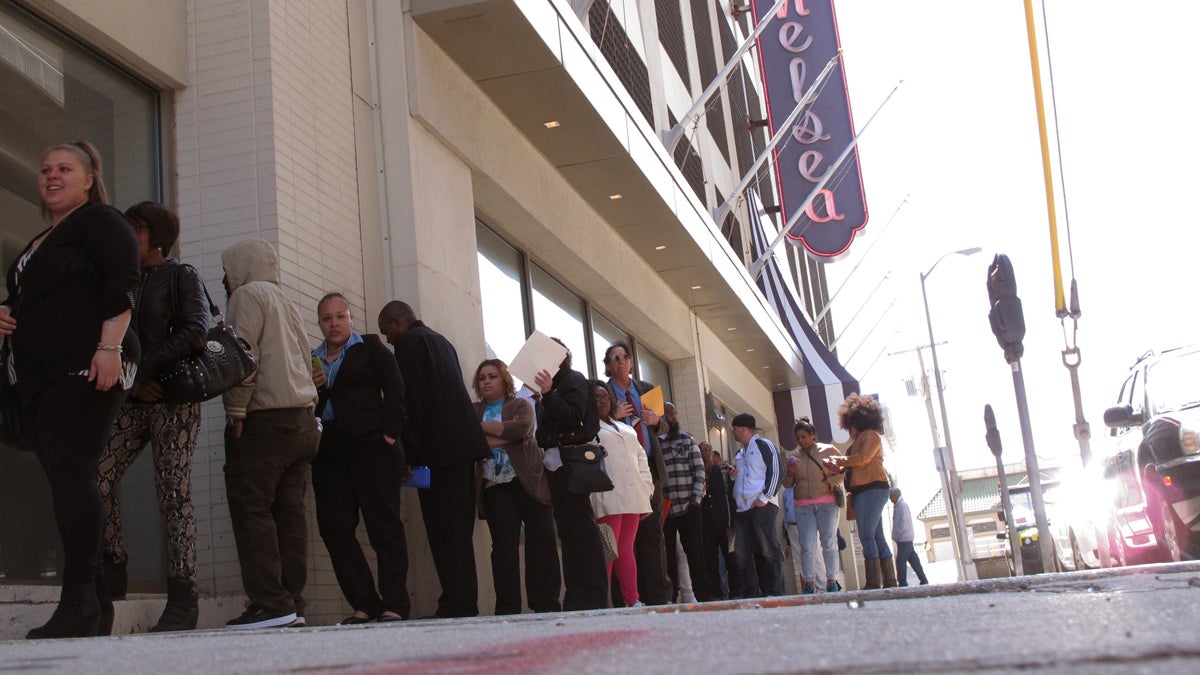Third of New Jersey households can’t afford basic necessities, study finds

Applicants for jobs at the Chelsea hotel in Atlantic City N.J. line up outside it on Wednesday April 22
More than a third of New Jersey families could not afford the basic necessities of rent, food, and health care in 2014, according to a new report by the United Way of Northern New Jersey.
The effects of the Great Recession, such as sluggish job growth, coupled with one-time events like Superstorm Sandy contributed to growing financial uncertainty among New Jersey families, the nonprofit said.
The report aimed to calculate the number of New Jersey families that the United Way considers “ALICE,” which stands for “asset limited, income constrained, and employed.”
ALICE households are above the poverty line but nevertheless struggle to afford a basic cost of living, often because wages are too low to meet that minimal standard.
United Way researchers found that 1.2 million New Jersey households were either living below the poverty level or considered ALICE in 2014 — some 37 percent of the state’s households that could not pay for basic necessities.
Lead researcher Stephanie Hoopes said that ALICE households are often made up of people working minimum- or low-wage jobs, whose earnings have not kept pace with inflation.
“Office clerks, cleaners, home health aides, nurses, teaching assistants,” said Hoopes. “These are jobs that we need. And you need to be there in person — they can’t be telecommuted or outsourced.”
United Way determines ALICE households by using a barometer called the Household Survival Budget, which was almost three times the poverty rate.
The nonprofit found that a single adult needs $24,300 per year to survive in New Jersey and that a family of four with two children under age 5 needed at least $64,176.
That cost of living rose by 23 percent since 2007, outpacing the rate of inflation of 14 percent.
To make matter worse, the report found that more than half the jobs in New Jersey pay less than $20 per hour.
“I’ve seen so many of my own friends lose their houses to foreclosure. So many people that I know have gone through bankruptcy because they can’t afford to pay their bills,” said Charlene O’Brien, who lives in North Jersey and has a job providing training to child care centers.
O’Brien, who once had a job at a bank, is now considered ALICE and said her family struggles to stay afloat. “I was paying my utility bills on my credit card just to try to make ends meet.”
However, researchers added that New Jersey officials were taking some steps to help impoverished and ALICE households.
For example, Gov. Chris Christie and the state Legislature agreed to raise the earned income tax credit, which went to more than 600,000 New Jerseyans last year, to 35 percent of the federal level in 2017.
WHYY is your source for fact-based, in-depth journalism and information. As a nonprofit organization, we rely on financial support from readers like you. Please give today.




